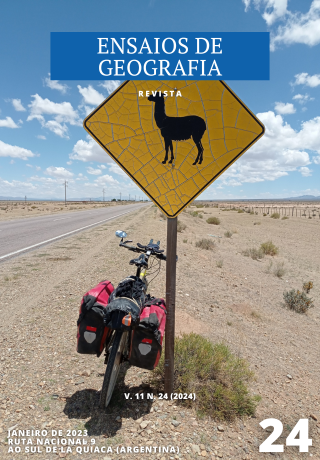A View of the Territory Through Participatory Mapping in the Pituba District in Baía Formosa/RN
DOI:
https://doi.org/10.22409/eg.v11i24.63324Keywords:
Social cartography, Territory, CommunitiesAbstract
Participatory mapping, through the practice of Social Cartography (SC), directly involves communities in the identification and representation of the physical and social aspects of their territories. This study presents the results of the participatory mapping carried out in the Pituba district, in Baía Formosa, Rio Grande do Norte, in northeastern Brazil. Four methodological phases of SC were followed, adapted to the study area: 1) establishing connections between researchers and the community to understand the local context; 2) using cartographic techniques and conducting thematic workshops; 3) developing and analyzing cartographic materials, including converting analog maps to digital formats; 4) delivering the maps and discussing possible applications. It is expected that the results, especially the highlighted potentialities and socio-environmental issues, will guide municipal public policies and contribute to promoting more just and sustainable development for the Pituba district. It is concluded that the sharing of knowledge and collaboration among all involved have the potential to transform challenges into opportunities. Participatory mapping presents the residents’ perspective and their daily experiences, contributing to the understanding of the territory’s and community’s reality.
Downloads
References
ACSELRAD, H. (Org.). Cartografia social, terra e território. Rio de Janeiro: IPPUR/UFRJ, 2013.
ACSELRAD, H.; COLI, L. R. Disputas cartográficas e disputas territoriais. In: ACSELRAD, H. (Org.). Cartografias sociais e território. Rio de Janeiro: Universidade Federal do Rio de Janeiro, Instituto de Pesquisa e Planejamento urbano e Regional, 2008.
ALMEIDA, B. F. M. Cartografia social e conflitos territoriais no assentamento Sabiaguaba, Ceará, Brasil. 2018. 102f. Dissertação (Mestrado em Geografia) – Departamento de Geografia, Universidade Federal do Ceará, Fortaleza, 2018.
BRASIL. Lei nº 11.977, de 7 de Julho de 2009. Dispõe sobre o Programa Minha Casa Minha Vida – PMCMV e a regularização fundiária de assentamentos localizados em áreas urbanas. Brasília, 2009. Disponível em: https://www.planalto.gov.br/ccivil_03/_ato2007-2010/2009/lei/l11977.htm Acesso em: 15 mai. 2024.
COSTA, N. O.; GORAYEB, A.; PAULINO, P. R. O.; SALES, L. B.; SILVA, E. V. Cartografia Social uma Ferramenta para a Construção do Conhecimento Territorial: Reflexões Teóricas acerca das Possibilidades de Desenvolvimento do Mapeamento Participativo em Pesquisas Qualitativas. ACTA Geográfica, Boa Vista, Edição Especial V CBEAGT, 2016. p.73-86. Disponível em: https://revista.ufrr.br/actageo/article/view/3820. Acesso: 5 jan. 2021.
GORAYEB, A.; MEIRELES, A. J. A.; SILVA, E. V. Princípios básicos de Cartografia e Construção de Mapas Sociais. In: GORAYEB, A.; MEIRELES, A. J. A.; SILVA, E. V. (Org.). Cartografia Social e Cidadania: experiências de mapeamento participativo dos territórios de comunidades urbanas e tradicionais. Fortaleza: Expressão Gráfica Editora, 2015.
HAESBAERT, R. Des-territorialização e identidade: a rede gaúcha no Nordeste. Niterói: EdUFF, 1997.
HAESBAERT, R. O Mito da Desterritorialização. Rio de Janeiro: Bertrand Brasil, 2004.
SOARES, L. G. Paisagem, comunidade e território: diálogos de saberes e mapeamento participativo em Baía Formosa (RN). 2024. 189f. Dissertação (Mestrado em Geografia) – Departamento de Geografia, Universidade Federal do Rio Grande do Norte, Natal, 2024.
SILVA, C. N.; VERBICARO, C. O mapeamento participativo como metodologia de análise do território. Scientia Plena, [S. l.], v. 12, n. 6, 2016. DOI: 10.14808/sci.plena.2016.069934. Disponível em: https://www.scientiaplena.org.br/sp/article/view/3140. Acesso em: 18 jul. 2024.
Published
How to Cite
Issue
Section
License
Copyright (c) 2024 Da Revista (Ensaios de Geografia) e do Autor

This work is licensed under a Creative Commons Attribution 4.0 International License.
CC BY Attribution. Others may distribute, remix, transform, and build upon the material for any purpose, even commercially, provided they give the author and licensor the credits.


